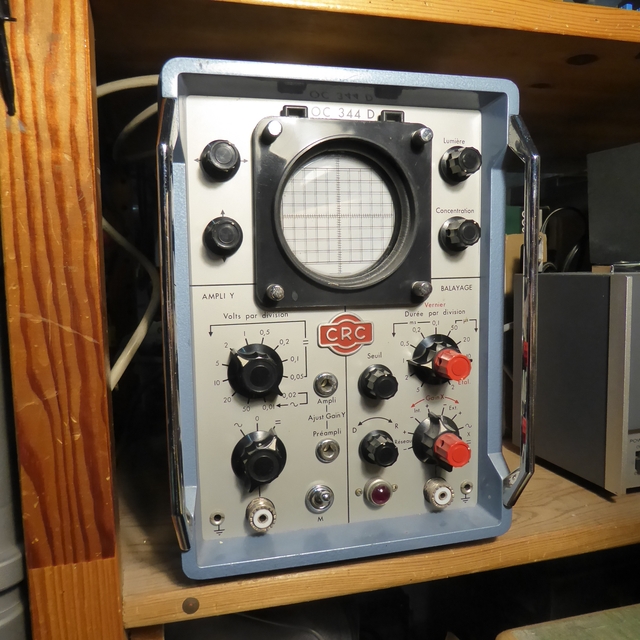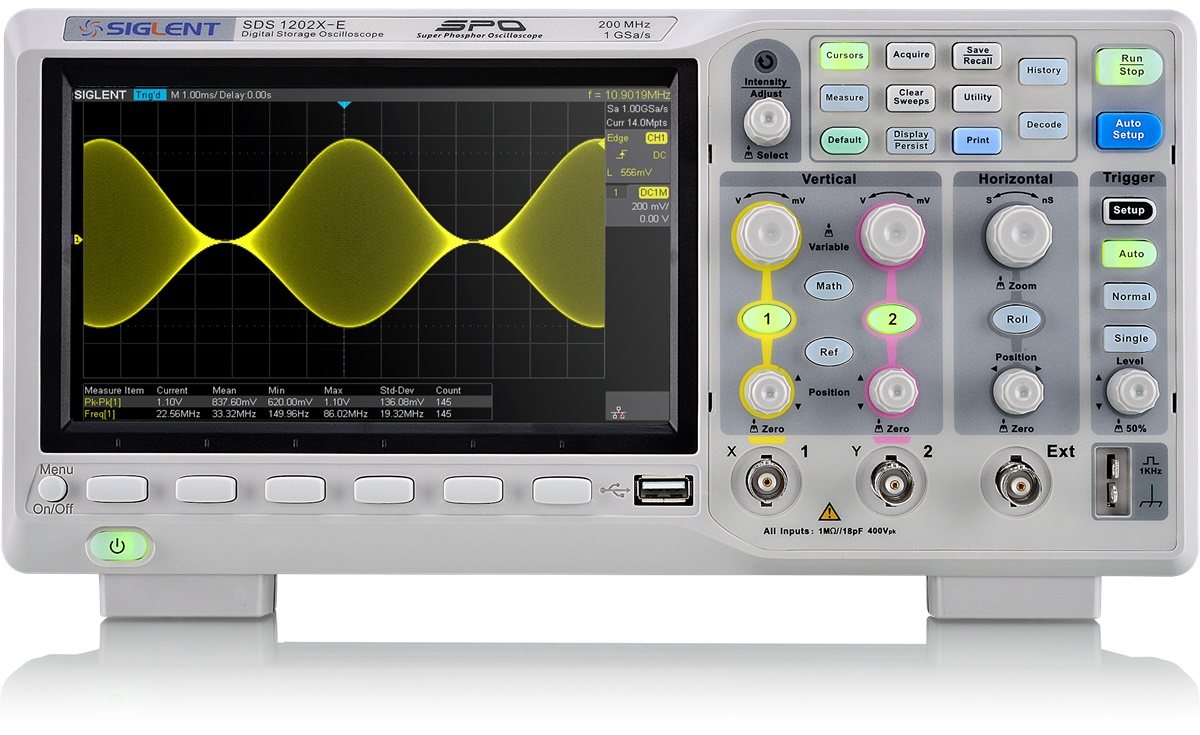Hi,
I'm designing some valve audio circuits and trying to fix/debug broken amplifiers. It's time to upgrade from my crappy multimeter!
For audio, scopes can be slow, like 20MHz is enough, but I would like high bit depth to have a good dynamic range. But it seems not possible at a reasonable price. I want an FFT feature, or at least the ability to get the waveform out into a computer for processing.
I heard cheaper scopes tend to be killed by ESD or by voltages in amps, so something robust would be better.
Any recommendations?
I'm designing some valve audio circuits and trying to fix/debug broken amplifiers. It's time to upgrade from my crappy multimeter!
For audio, scopes can be slow, like 20MHz is enough, but I would like high bit depth to have a good dynamic range. But it seems not possible at a reasonable price. I want an FFT feature, or at least the ability to get the waveform out into a computer for processing.
I heard cheaper scopes tend to be killed by ESD or by voltages in amps, so something robust would be better.
Any recommendations?
What you need is a good modern 'scope (for the FFT), and some good safe 50:1 or 100:1 fixed ratio probes.
People do use 10:1 probes on high voltages but this is where many of the anecdotes come from as most probes are not high voltage rated(*), and its all to easy to accidentally slip the x1-x10 switch to x1, killing the 'scope's frontend.
(*) for instance the trimmer cap or 9M resistor may be low voltage types.
People do use 10:1 probes on high voltages but this is where many of the anecdotes come from as most probes are not high voltage rated(*), and its all to easy to accidentally slip the x1-x10 switch to x1, killing the 'scope's frontend.
(*) for instance the trimmer cap or 9M resistor may be low voltage types.
You can pick up cheap FFT PC scopes on ebay.
But you will need at least a x100 probe for valve voltages.
But you will need at least a x100 probe for valve voltages.
Thanks folks,
I'll just get someone reasonably priced, but will make sure I upgrade the probes, thanks for the tip.
There is a gap in the marked for a high resolution but slow oscillator specialised for audio frequencies and high voltage. Would be a great too for debugging and characterization, could be built around a sound card.
It's the kind of project that must already exist but I have not found!
I'll just get someone reasonably priced, but will make sure I upgrade the probes, thanks for the tip.
There is a gap in the marked for a high resolution but slow oscillator specialised for audio frequencies and high voltage. Would be a great too for debugging and characterization, could be built around a sound card.
It's the kind of project that must already exist but I have not found!
If you really want to get into high voltage oscilloscope measurements you should look into active differential probes. They used to be prohibitively expensive, but there have been a couple of new and affordable offerings recently.
In guitar amps there could be 500V signal from the power tubes. Maybe a bit less or a bit more depending on the specifics. And generally just need enough quality to get an idea of what is going on, but other than that not too interested in super high voltage measurements.
Here's a scope photo I took of a relay coil flyback pulse, using a stock standard Rigol DS1000 digital scope and the 10X probes that came with it. 600V peak: 6 vertical divisions, times 100 volts per division. Positive edge triggering, trigger threshold 236 volts.

link to the full story
link to the full story
I bought one of these : New Digital 2.4" LCD Handheld Oscilloscope DSO1511E+ 120MHz 500MS/s ARM FPGA ADC | eBay thinking it was a toy but it has been quite useful. One channel only. But battery powered. the auto setup and trigger work OK. it has FFT and an audio spectrum feature. And its cheap enough that frying it won't feel so bad. Its not my only scope.
However for working on HV tube stuff I would advocate for a Tek P6009 X100 probe. The older design it better suited to tube stuff being larger. It keeps your hands further from the HV. And the input resistance and capacitance is low so it won't load the circuits as much.
The combination above I think would be well suited to tube troubleshooting with the whole thing isolated. Still pay attention to all the HV hazards.
However for working on HV tube stuff I would advocate for a Tek P6009 X100 probe. The older design it better suited to tube stuff being larger. It keeps your hands further from the HV. And the input resistance and capacitance is low so it won't load the circuits as much.
The combination above I think would be well suited to tube troubleshooting with the whole thing isolated. Still pay attention to all the HV hazards.
Thanks,
Do you use isolation transformer for developing your own circuits or just for things you don't trust?
Might be getting a bit off topic!
I know you have to be very careful with grounding in this situation with a scope.
Do you use isolation transformer for developing your own circuits or just for things you don't trust?
Might be getting a bit off topic!
I know you have to be very careful with grounding in this situation with a scope.
I bought one of these : New Digital 2.4" LCD Handheld Oscilloscope DSO1511E+ 120MHz 500MS/s ARM FPGA ADC | eBay thinking it was a toy but it has been quite useful. One channel only. But battery powered. the auto setup and trigger work OK. it has FFT and an audio spectrum feature. And its cheap enough that frying it won't feel so bad.
That does look liike it could be useful. What battery does it use? How much work time do you get from a charge?
You realize that using a cheap 10x probe on lethal voltages is risky? If the probe flashs over internally while on a high voltage supply rail, bang goes your scope front end. It might even flash-over through the adjustment hole and bite you.Here's a scope photo I took of a relay coil flyback pulse, using a stock standard Rigol DS1000 digital scope and the 10X probes that came with it. 600V peak: 6 vertical divisions, times 100 volts per division. Positive edge triggering, trigger threshold 236 volts.
If you've even seen what high voltage DC flashover can do you'd be more careful about implicitly recommending inadequate equipment for high voltages.
And again I'll say you need a fixed divider, no switch, for high voltage use.
I still like my 1964 French Navy full tube CRC OC344D...

... Along with my full digital Siglent 1202X-E :

A+!

... Along with my full digital Siglent 1202X-E :

A+!
I use a fixed divider -- the small Altoids tins for various attenuators with "panel mount" BNC male and female connectors -- but remember to use high voltage resistors as carbon comp resistance is a function of the end-to-end voltage.
That does look liike it could be useful. What battery does it use? How much work time do you get from a charge?
Its got an LI battery and charges from USB. Seems good for several hours. More than I have used at a stretch.
I also have one of these: https://www.amazon.com/Oscilloscope...ocphy=9032039&hvtargid=pla-943972418824&psc=1 which seems OK but twice as expensive for 2 channels. Also battery powered.
And a Siglent, and 8 Tektronix scopes at last count. All serve different purposes.
OK thanks. I have plenty of scopes but nothing anywhere near as portable as that. Single channel is fine for in-situ audio troubleshooting, but I'm thinking something 1MSa/12-bit with FFT would be more useful.
I think the 12 bit will be a bit of a roadblock. All I have seen are 8 bit. Picoscope has some good stuff but that gets expensive again.
RE the $75 scope. I checked its bandwidth since I have seen lots of comments elsewhere questioning it. What I measured was full response to 50 MHz and -6 dB at 100 MHz. It does have some overshoot on fast transients. However as these devices are often marked- "for indication only" not calibrated. And still quite useful.
I would like a good 12 bit FFT in a smaller package. My Tek/Wavetek is great but big and clumsy. PC based FFT's are also somewhat clumsy as well.
RE the $75 scope. I checked its bandwidth since I have seen lots of comments elsewhere questioning it. What I measured was full response to 50 MHz and -6 dB at 100 MHz. It does have some overshoot on fast transients. However as these devices are often marked- "for indication only" not calibrated. And still quite useful.
I would like a good 12 bit FFT in a smaller package. My Tek/Wavetek is great but big and clumsy. PC based FFT's are also somewhat clumsy as well.
I designed my own 10 bit dual channel USB scope.
Its pc based via USB.
Has usual digital scope functions plus a spectrum analyser.
Only 17 mega samples/second but adequate for most audio projects.
Its pc based via USB.
Has usual digital scope functions plus a spectrum analyser.
Only 17 mega samples/second but adequate for most audio projects.
Yeah, I was thinking of something handheld like the now-ubiquitous DSO150 but with FFT:
New 2.4" LCD Display DSO150 Digital Oscilloscope Assembled Case Test Clip Power | eBay
Definitely do not want to be tethered to a PC to use it.
Even 10 bits would be OK. My 'daily driver' is a Lecroy 9430, 10-bit 100MSa/Sec 150MHz, with great waveform processing. Resolves 68dB with a little averaging. But I'm not gonna lug it around... it's on the bottom of a pile on the bench 🙂
New 2.4" LCD Display DSO150 Digital Oscilloscope Assembled Case Test Clip Power | eBay
Definitely do not want to be tethered to a PC to use it.
Even 10 bits would be OK. My 'daily driver' is a Lecroy 9430, 10-bit 100MSa/Sec 150MHz, with great waveform processing. Resolves 68dB with a little averaging. But I'm not gonna lug it around... it's on the bottom of a pile on the bench 🙂
- Home
- Design & Build
- Equipment & Tools
- Oscilloscope recommendations for valve audio circuits